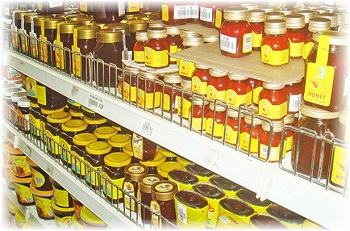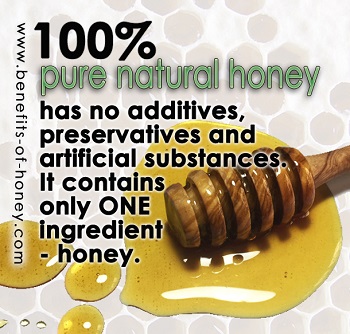
Which Honey to Buy?
"Which honey to buy?", "Which honey is best?", "Which brand shall I buy?", "What's the difference between pure honey and raw honey?", "Is raw honey or organic honey more superior?', "Where can I buy quality honey?", "Is local honey better?", "Which floral varietal is the best?" - These are probably the most frequently asked questions from people who have just discovered honey and want to know which bottle of honey to pick. I wish life were simple enough for me to address all these enquiries in a sentence or two. I'm afraid it isn't. Nevertheless, I'll attempt to get some of the terms "raw", "local", "pure", "organic" clarified here.
Raw is Best
My first and foremost advice on which honey to buy would be - raw local honey directly from a trusted beekeeper. Local honey comes from the bees that live in your neighbourhood and is well known to be a great immune booster against seasonal allergies. Also by buying local honey, not only you can play your part for the environment and reduce your food carbon footprint, you can be pretty sure that the honey you eat is local, 100% pure, unadulterated, and you can easily find out if it's raw and organic, without even really understanding what those terms mean. And if you have the zest of going the extra mile to trace the source of the food you eat, request a farm visit from your beekeeper and witness for yourself the whole process of obtaining the honey to be 100% assured of the honey quality.
What About Commercial Honey?
If bee farms and beekeepers aren't within any possible reach for you and accessing the freshest raw or any local farmers' market is out of the question, then regular, commercial honey from the stores and online shops would probably be what you are looking at. Now those who have been screaming "DO NOT buy grocery store-brand honey" would probably be appalled by the statement I just made. But they don't seem to have any idea how remote access to beekeepers can be for some people. You see, the idea of eating honey is about replacing as much refined sugar as possible in your diet. Where beekeepers are not within reach, 100% pure honey from the store is still better off than refined sugar. The same logic applies when comparing other sweeteners - one would be far better off with table sugar than high fructose corn syrup or any artificial sweetener.
All Types of Honey Equal?
First, before we try to understand the marketing labels on honey and which is the best honey to buy, we need to know that no all honey is "created" equal. Apart from the type of floral nectar collected by the bees, multiple factors related to the floral source of the honey can affect the quality of honey, for instance weather, soil, landscape, environment pollution level (e.g. New Zealand boasts exceptionally low levels of environmental pollution for beekeeping operations). Other determinants are beekeeping practices, ethics, culture, and legal policies in the country (eg the administration of sugar syrup and antibiotics to bees, the use of strong chemicals to fight varroa mites and small hive beetles in the hives), etc.
Medicinal Grade Versus Food Grade
Making choices and decisions on which honey to buy for us consumers can appear to be complicated when so many beekeepers from different parts of the world are shouting unverifiable claims that they offer the best and purest honey in the world. Also, some honey varieties have more medicinal value than others due to its higher anti-bacterial properties e.g New Zealand's Manuka UMF 10+ and above, Malaysia's Tualang honey, Yemeni Sidr honey and European honeydew honey. Such varietals of honey are tagged 10 or 20 times more in price than regular honey and are simply beyond the reach of many consumers' purchasing power. So, these expensive varietals are usually not consumed on a daily basis but kept as a treasure for treating burns, cuts, coughs, sore-throats, infections, and other ills. But of course there are people who somehow believe only in Manuka and consume it daily (and they have tried to convince me that that is the only honey worth eating).

Raw, Pure, Real Honey Claims
The appeal of raw honey is that is unprocessed, unheated and has all its live, nutritious enzymes preserved. However, there are no strict legal requirements for claiming and labelling honey as "raw". You may find raw honey that are unprocessed but slightly warmed to retard granulation for a short period of time and allow light straining and packing into containers for sale. Claims of "pure honey" on labels can be ambiguous and may not necessarily be equivalent to 100% pure honey as the product may contain "real honey" in an unknown amount. Many brands, including those labelled as "natural", offer honey that is pasteurized or treated with heat to slow down the process of crystallisation so that they remain smooth and presentable on the shelves. They are also well filtered, and thus look clean and speck-free. I agree this could be partly due to allergy concerns, but many consumers also associate honey containing pollens and brown substances, and even crystallisation with impurities and poor quality and refuse to buy it. What a sorry irony.
Local Versus Imported Honey
Imported, foreign honey can be much cheaper than local honey, and this makes it extremely hard for small local beekeepers to compete with the big honey suppliers who are exporting in huge volumes to different countries. So, support your local beekeepers by buying local honey but be wary, as a lot of foreign honey is now locally packed and sold as "local honey". For instance, America imports most of their honey from China to repackage and label it as their local products. Nonetheless, I reckon it's not an easy subject to deliberate when the harsh reality of life sets in and cuts deep - while beekeepers find it ridiculous to sustain pleasures in beekeeping when confronted with dire livelihood issues, consumers feel it's impossible to support relatively more expensive local honey with their limited spending power.
Organic Labels
Whether it has to be organic honey depends on whether you are an ardent believer of organic foods as a whole. For honey to be certified organic, the manufacturer has to meet a set of stringent organic standards and conditions during the honey production (set by a organic agriculture certification body), which include source of the nectar, honey bees foraging area, bees management, honey extracting process, transportation, processing temperature, and packaging materials. Go for organic honey if you feel that it's a healthier choice worth paying the extra and you could have that peace of mind by eating honey that has been tested and guaranteed to be free of any residues of pesticides or environmental pollutants.
Monofloral Versus Multifloral
Another very important consideration regarding which honey to buy (at least for me as a consumer) is the palate. Taste of honey labelled "floral blend" or "multiflora" varies according to the different floral types from which nectar is collected. If you are not satisfied with eating honey of unidentified floral varietals, then explore the mono-floral varietals. Choose a floral varietal that goes down well with you especially if you are taking direct or mixing it with just water for daily consumption. Taste can be very subjective and personal, so not every variety is going to wow everyone. If you are using honey in your beverage and other foods, experiment with get a few varietals, do some trial and error to see how combinations of food and honey types work for you. Generally, for food or dishes with very distinct, strong taste, go for a mild light taste honey, whereas for food that is blander, you can try a stronger honey to create a tastier concoction, e.g English breakfast tea tastes a world of difference when a flavoursome honey such as a leatherwood or eucalyptus floral varietal is added to it. But of course, if you are prepared for a more adventurous experience with honey, you can break all rules and combine any type of honey with any type food. Possibilities with honey flavour nuances are never-ending.
Related Articles
1. How do you choose the best honey to buy? Is it true that any honey is good, as long as it is real? More in: Any Honey is Good?
2. The story of Tara Bambrick would make you think twice about buying Chinese honey: Chinese Honey, What's In It?
3. A question that many are curious about: Do You Eat Honey From China?
4. Get tips that would lend you clues on what to expect from reading honey labels: Natural Honey, Pure Honey, Raw Honey ~ Making Sense of Honey Labels.
5. Trying to make sense out of food labels and figuring which honey to buy? How much is truth and how much is pure marketing tactics? Read: Did You Know Reading Food Label Can Be So Tricky?
6. Get these facts straight to be clear about these terms and concepts - pure honey, cream honey versus clear liquid honey, crystallisation of honey, honeycomb, monofloral varietals, darkening of honey, viscous versus runny honey, honey storage, and more in: Frequently Asked Information About Honey.
7. Honey enthusiasts are streaming in to suggest their method of testing honey purity. But do they really work? More in: How to Test for Pure Honey.
8. Where can I find good quality honey? More in: Where to Buy Honey.
9. Which is the best honey to buy? Raw, pure, organic, creamed? Which Honey is The Best?.
End of "Which Honey to Buy?". Back to "Do You Eat Honey From China?".